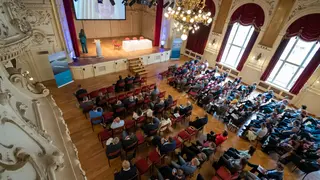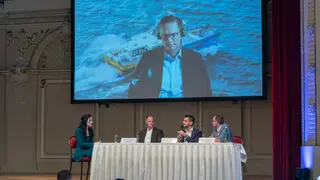Linz – Opportunities, trends and the future of the waterway finally got back on the big stage. On October 12 and 13, about 150 participants of the Danube Business Talks conference, organised by viadonau at the Palais Kaufmännischer Verein in Linz, witnessed that the Danube region as an economic factor is more lively, dynamic and relevant than ever. The main topic: climate protection and how companies, political decision-makers and infrastructure operators want to position the Danube in the first row of transport modes for a more environmentally friendly transport network in Europe. Accordingly, the motto of the event, which is also a signal for the departure into this future: Green Deal – Green Danube.
In the light of the European Green Deal and the targeted climate neutrality by 2050, the sustainable development of the Danube is no longer a marginal note of transport policy, but an essential criterion for the climate future. This was made clear by representatives of national and international politics, such as the Austrian Climate Protection Minister Leonore Gewessler in her welcome note and CINEA Director Dirk Beckers (European Climate, Infrastructure and Environment Executive Agency) already at the beginning of the new edition of the Danube Business Talks. Particularly important: more attention for the Danube as a high-performance transport option, clear guidelines to promote the shift of transport, especially of oversized cargoes, such as the new regulation of special transports in Austria, which has been in force since 2022, but also an innovative international project environment, provided for example by the PLATINA 3 platform, which is dedicated to the development of more environmentally friendly propulsion concepts and the provision of so-called zero-emission services. It is also clear that the modernisation of inland navigation must include its infrastructural framework. Gert-Jan Muilerman, viadonau strategy expert, provided tangible examples of this: The upgrade of berth for dry cargo in Linz 2021 and the current establishment of the berth in Wildungsmauer as part of the EU co-financed project "FAIRway works! in the Rhine-Danube Corridor" were important successes that made the continuous improvement of the navigation infrastructure - increased safety and usability of the waterway but also the provision of shore power - on the Danube visible.
Infrastructural and digital upgrading go hand in hand on the Danube. Today, boatmasters not only navigate with electronic precision, administrative processes are also handled digitally. Karin De Schepper from Inland Navigation Europe (INE) highlighted the great importance of new Europe-wide standardised systems in terms of waterway information services: EuRIS - a RIS platform that provides all navigation-relevant fairway data in 13 countries - and the new electronic reporting system CEERIS are outstanding milestones of the RIS COMEX project coordinated by viadonau, which was completed in 2022. Another digital advance that is changing a working environment, that has always placed special demands on the transport industry and logistics. Vera Hofbauer, head of section at the Federal Ministry for Climate Action, Environment, Energy, Mobility, Innovation and Technology (BMK) therefore sees the expansion of special training programs for inland navigation as one of the most important measures for modernising inland navigation. The REWWay education platform, which was set up by Logistikum Steyr together with viadonau is today one of the most sought-after online contact points for the constantly growing demand for waterway-specific teaching and learning material and has a strong role model effect for other emerging concepts in the entire transport sector.
Climate change is forcing fundamental changes in business and society. Green Deal, UN Sustainable Development Goals, and responsible business ethics are firmly integrated into the values and goals of numerous "big players" on the Danube. For OMV, for example, climate neutrality by 2050 is also a declared goal. For more than 80 years, the company has relied on shipping as an essential part of the value chain. According to Jana Gavril, Senior Expert for Strategic Logistics at OMV Downstream GmbH, around 1 million tons of petroleum products are transported across the Danube every year. As an oil, gas and chemicals group, OMV is committed to the EU climate goals. Therefore, it is important to significantly reduce the ecological footprint of the company and, for example, to reduce the C02 emissions of the company by up to 30 percent by the end of the decade.
The waterway is a particularly environmentally friendly mode of transport whose great climate protection potential can be further increased, especially in terms of shipping and power supply. According to Sascha Gill of Viking River Cruises, around 16,000 ships travel Europe's rivers, for which "greening" incentives need to be created for switching to more climate-friendly fuels or retrofitting to more modern propulsion systems. The broad-based EU NAIADES III program would set a clear course for this. In order to achieve the zero-emission targets by 2050, Gill believes that the consistent expansion of the shore-side power infrastructure offers particularly large opportunities for CO2 savings of up to 45 percent. The expert is convinced that climate-conscious travel and sustainable offers for tourism are demanded by customers. Responsible management must therefore be a natural element of quality services and offerings.
The waterway is not only a place for environmentally oriented modernisation, moreover it literally transports it. The essential hubs for this are the ports. Mobility expert Marjan Beelen from the Port of Antwerp - the largest transhipment point for RoRo (Roll-On-Roll-Off) goods in Europe -, Peter Stöttinger from Felbermayr and Jürgen Plauensteiner from Rhenus Donauhafen Krems, where the optimal use of the waterway has been demonstrated for many years, for example with the handling of construction elements for wind energy plants, put a striking exclamation mark behind the motto of the Danube Business Talks with positive economic impulses and the constant expansion of the ports‘ superstructure. The message of the conference, which was carried by the many experts and which Austria's Minister for Climate Protection so pointedly emphasized in her welcoming remarks, was all the clearer at the end. Minister Leonore Gewessler: "The motto of this year's Danube Business Talks - Green Deal - Green Danube - is intended to show that we on the Danube are doing our homework and making a strong contribution to the declared goal of the European Green Deal to actually be the first climate-neutral continent by 2050, also and especially with the Danube waterway."
Networking is the key
Current topics, variety of themes and concentrated expertise are only part of the success of the Danube Business Talks. This year, it was important to viadonau to again create the appealing contrast between a specialist conference on the one hand and an appropriate setting for personal exchange on the other. While targeted business contacts could be established at the Business Dating, an excursion to the ÖSWAG shipyard in Linz combined the conference topics with exciting impressions of shipping technology. Furthermore, the Danube Business Talks 2022 were accompanied digitally by competent experts. A large part of the presentations and debates could also be followed via streaming.
Downloads [Presentations (PDF)]
Future perspective of inland navigation in European Green Deal (Karin De Schepper, INE)
Austrian policy initiatives and new funding possibilities for greener vessels (Vera Hofbauer, BMK)
New challenges for waterway management Our path to energy self sufficiency (Gert-Jan Muilerman, viadonau)
OMV’s Contribution to Climate neutrality (Jana Gavril, OMV Downstream GmbH)
Your breakbulk home port (Marjan Beelen, Port of Antwerp Bruges)
Power in motion on the Rhine-Danube Corridor (Peter Stöttinger, Felbermayr Transport- und Hebetechnik GmbH & Co KG)
Rhenus port logistics (Jürgen Plauensteiner, Rhenus Donauhafen Krems)
Lower Danube Cruising Perspectives and Challenges (Radu Comanici)
Development of new international passenger terminals in Serbia New Destinations for Sustainable Travel (Port Governance Agency, Serbia)
Green Award for inland navigation (Jan Fransen, Green Award)
Greening projects for inland navigation in Europe (Martin Quispel, PLATINA 3)

